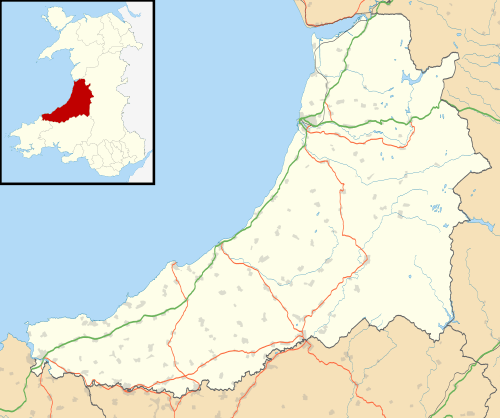Adpar
| Adpar | |
|---|---|
 Looking over the bridge across the Teifi to Adpar | |
 Adpar Adpar shown within Ceredigion | |
| OS grid reference | SN309409 |
| Community | |
| Principal area | |
| Ceremonial county | |
| Country | Wales |
| Sovereign state | United Kingdom |
| Police | Dyfed-Powys |
| Fire | Mid and West Wales |
| Ambulance | Welsh |
| EU Parliament | Wales |
| UK Parliament | |
| Welsh Assembly | |
Adpar, formerly Trefhedyn, is a village in Ceredigion, in the community of Llandyfriog, Wales now considered as a part of Newcastle Emlyn to which it is joined by a fine bridge across the River Teifi. Adpar used to be an ancient Welsh borough in its own right.[1]
History
The Royal Commission on the Ancient and Historical Monuments of Wales records a "possible medieval castle motte" within the village. The mound is low, about 3½ metres in height and damaged in subsequent periods.[2]
At one time Adpar was relatively more important than it is now. It used to be an ancient borough, returned its own member of parliament and had a port-reeve and two bailiffs. It had a market and several seasonal animal fairs. Several industrial enterprises used the fast-flowing waters of the River Teifi for power, including a woollen mill that produced flannel, blankets and knitting yarn. There was also a fishing weir above the bridge to catch migratory salmon.[3]
The first permanent printing press was established in Adpar in 1719 by Isaac Carter (printer and native of Carmarthenshire). it's believed that the first two publications from this press were Welsh language Cân o Senn i’w hen Feistr Tobacco by Alban Thomas and Cân ar Fesur Triban ynghylch Cydwybod a’i Chynheddfau. The press was transferred to Carmarthen in about 1725.[1]
The last duel that took place in Cardiganshire occurred in Adpar in 1814.[1] The last recorded use of stocks in the United Kingdom was in Adpar in 1872.[4]
References
| Wikimedia Commons has media related to Adpar. |
- 1 2 3 "About Adpar". Newcastle Emlyn and Adpar / Castell Newydd Emlyn ac Adpar. Archived from the original on 8 October 2009. Retrieved 11 Nov 2009.
- ↑ "ADPAR, MOTTE". Royal Commission on the Ancient and Historical Monuments of Wales. 2009. Retrieved 11 Nov 2009.
- ↑ Jenkins, J. Geraint. Ceredigion: Interpreting an Ancient County. Gwasg Careg Gwalch (2005) pg. 25.
- ↑ John May, Reference Wales (1994)